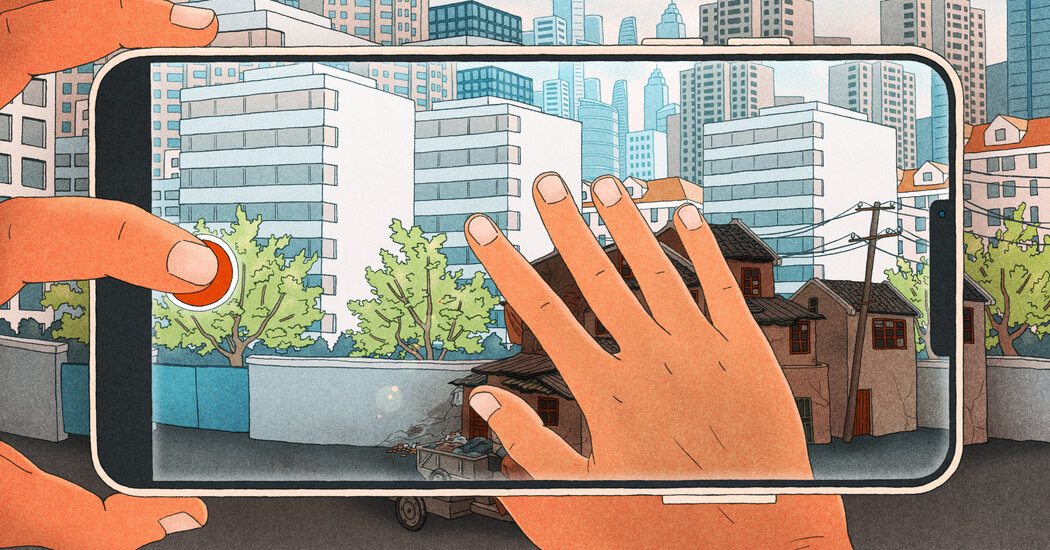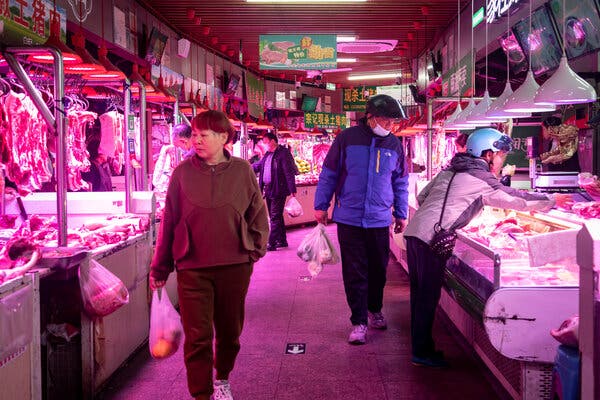Hamartia Antidote
ELITE MEMBER

- Joined
- Nov 17, 2013
- Messages
- 35,188
- Reaction score
- 30
- Country
- Location

Why China’s Censors Are Deleting Videos About Poverty
Xi Jinping says he has defeated poverty, but discussion of economic struggle is taboo, scrubbed from the internet and banished from the news.
Xi Jinping says he has defeated poverty, but discussion of economic struggle is taboo, scrubbed from the internet and banished from the news.

Li Yuan
阅读简体中文版閱讀繁體中文版A heartbreaking video of a retiree that showed what groceries she could buy with 100 yuan, or $14.50 — roughly her monthly pension and sole source of income — went viral on the Chinese internet. The video was deleted.
A singer vented the widespread frustration among young, educated Chinese about their dire finances and gloomy job prospects, like gig work. “I wash my face every day, but my pocket is cleaner than my face,” he sings. “I went to college to help rejuvenate China, not to deliver meals.” His song was banned and his social media accounts were suspended.
A migrant worker toiling to support his family gained widespread sympathy and attention last year after he tested positive for Covid, and officials released extensive details of his movements. He became known as the hardest-working person in China. Censors blocked discussions about him, and local authorities were stationed outside his house to prevent journalists from visiting his wife.
China says it is a socialist country that aims to promote common prosperity. In 2021, its top leader, Xi Jinping, declared “a comprehensive victory in the battle against poverty.” Yet many people remain poor or live just above the poverty line. With the country’s economic prospects dimming and the people’s increasing anxiety about their future, poverty has become a taboo subject that can draw ire from the government.
In March, the Cyberspace Administration of China, the country’s internet regulator, announced that it would crack down on anyone who publishes videos or posts that “deliberately manipulate sadness, incite polarization, create harmful information that damages the image of the Party and the government, and disrupts economic and social development.” It bans sad videos of old people, disabled people and children.
Behind the ban is a government eager to keep all talk about China positive. The Communist Party brags about how many people it lifted out of poverty in the past four decades, while refusing to mention how it had thrown the entire nation into abject poverty under Mao Zedong.

Because of propaganda and censorship in China, many people in the country weren’t aware of how prevalent poverty was in China.
Poverty alleviation is a medal the party flaunts to claim its legitimacy. But despite China’s rise as an economic power, it has a drastically inadequate social safety net, and the government is eager to block any discussion of the conditions poor people face.
Searching the Chinese word “pinkun,” or poverty, on the country’s biggest news portal, qq.com, the top news item is about research that shows poverty is the fourth leading cause of death in the United States. The news media seldom report about poverty’s systemic causes in China.
Hu Chenfeng recorded the footage that was removed from the Chinese internet. On popular video sites, he had posted a recording showing an elderly woman living on barely $15 a month. In the words of many social media commenters, he was revealing too much. “This subject is untouchable,” one commenter wrote on a now-deleted discussion thread on Zhihu, a site similar to Quora. Another wrote, “His account was censored simply because he showed what life is like for many people.”
In the video, which survives outside the Chinese internet on YouTube, Mr. Hu interviews the woman, a 78-year-old widow, on the street in the southwestern city of Chengdu. She said she planned to buy only rice, about the only thing she could afford. She hadn’t eaten meat for a long time. Tears rolled down her cheeks as she recounted her financial hardship. The two walk through a grocery store. They bought rice, eggs, pork and flour. The bill came to 127 yuan ($18). Mr. Hu insisted on paying.
He was emotional, too, signing off with “a heavy heart.”
The video was removed from the two biggest user-generated video platforms in China. Mr. Hu’s accounts were suspended.
Even a discussion thread on Zhihu about why the government doesn’t allow videos about the poor was censored. “Because theoretically there’s no poor people in China,” one social media user speculated in a written post before the thread disappeared. “China has eliminated poverty.”
“Because this society only allows you to celebrate prosperity,” another commenter wrote. “You have to shoulder all the sufferings yourself and not share them online.”
Income inequality is a problem in many countries, including the United States. In China, the biggest divide in wealth is among rural and urban residents. The gap is created by government rules that peg social benefits, including schooling, health care and pensions, to where a person was born, not according to their residence, income or needs. The policy hurts retirees in particular.
In 2021, older people from the countryside received on average $27 a month in social security benefits, according to a government report. That pension is merely about 5 percent of what the average urban retiree gets.
One viral video about seniors struggling to make ends meet took place in one of China’s most populous provinces, Henan, where the government raised monthly pensions for rural residents from $16 to $18 this year. The video shows two porters in their 70s unloading a truckload of cement using their hands and shoulders.
In China’s go-go years of miraculous economic growth, straddling the 1990s to mid-2010s, poverty wasn’t a topic that people paid much attention to. Now, with the country’s economic engine sputtering, Chinese who are new to the middle class are worried that they could fall back into poverty, part of the reason these videos attracted attention.

Poverty is seen as a novelty among the middle class in China partly because local governments chase homeless people off the streets.
Because of propaganda and censorship, many of them weren’t aware of the depth and prevalence of poverty in the country.
When the premier at the time, Li Keqiang, said in 2020 that 600 million Chinese — 40 percent of the population — had monthly income of less than $150, some people, who didn’t know where the numbers came from, called it fake news. The official People’s Daily had to call on the State Statistics Bureau to confirm it was true. The official Chinese press seldom mentioned the inconvenient number again.
Another reason poverty is seen as a novelty among the middle class is that local governments usually chase beggars and homeless people off the streets. They become invisible in big cities. A friend’s daughter in Beijing asked her last year what a beggar was. I recently met a 13-year-old new Chinese immigrant in San Francisco who was shocked by the sight of homeless people. She said she’d never seen one in Beijing.
The Beijing government does not only bar beggars and homeless people from staying in the city. In the winter of 2017, it kicked many low-income people out of their apartments to get rid of what it called “low-quality population.”
Now with video streamers roaming the country, trying to find revealing facts that attract online attention, the public can see the poor and some of the unpleasant aspects of life in China. That is one reason for the censorship.
In addition to poverty, the government doesn’t want the public to dwell on another big social problem: youth unemployment, which the government says has reached nearly 20 percent.
A songwriter used a well-known literary character, Kong Yiji, an educated but poor intellectual living during the Qing dynasty, to counter the government line that young people can’t find work because they aren’t trying hard enough. The song was censored and the singer’s online accounts suspended.
The official media, in turn, churned out articles about college graduates earning decent livings by collecting garbage or becoming street vendors.
The government wants to “deny the prevalence of economic recession and unemployment” and avoid accountability, a commenter wrote.
The same can be said about poverty. By censoring videos and online discussions, the government is evading its responsibility to provide the most basic social safety net to the poor.
“I shot these videos in the hope of making some money while pushing our society to move forward just a little bit,” Mr. Hu, the videographer, said in a video posted in a backup social media account that had not been blocked. “But I never expected that this is forbidden.”





